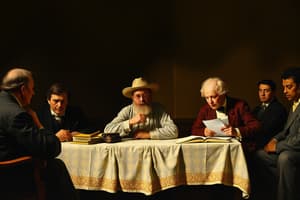Podcast
Questions and Answers
Which president began planning for the reunification of the United States before the Civil War ended?
Which president began planning for the reunification of the United States before the Civil War ended?
- Ulysses S. Grant
- Abraham Lincoln (correct)
- Andrew Johnson
- Rutherford B. Hayes
Which states were exempted from the liberating effects of the Emancipation Proclamation?
Which states were exempted from the liberating effects of the Emancipation Proclamation?
- Louisiana, Tennessee, and Arkansas (correct)
- Louisiana, Tennessee, and Virginia
- Arkansas, Virginia, and Missouri
- Delaware, Kentucky, Maryland, and Missouri
When was the Thirteenth Amendment, which legally abolished slavery, passed by Congress?
When was the Thirteenth Amendment, which legally abolished slavery, passed by Congress?
- January 31, 1863
- January 31, 1864
- January 31, 1861
- January 31, 1865 (correct)
Which amendment to the Constitution abolished slavery in the United States?
Which amendment to the Constitution abolished slavery in the United States?
Who succeeded Abraham Lincoln as President of the United States?
Who succeeded Abraham Lincoln as President of the United States?
What were the Black Codes?
What were the Black Codes?
Which amendment to the Constitution granted citizenship and protected due process and equal protection under the law?
Which amendment to the Constitution granted citizenship and protected due process and equal protection under the law?
Which group of individuals gained their freedom during the war and later entered political office?
Which group of individuals gained their freedom during the war and later entered political office?
Who were the African American officeholders who lost their positions when white Democrats regained power in the South?
Who were the African American officeholders who lost their positions when white Democrats regained power in the South?
When did African Americans enter the political arena again in large numbers?
When did African Americans enter the political arena again in large numbers?
Which president opposed the passage of the Fourteenth Amendment and vetoed the Civil Rights Act?
Which president opposed the passage of the Fourteenth Amendment and vetoed the Civil Rights Act?
Which political party won a two-thirds majority in the 1866 midterm elections?
Which political party won a two-thirds majority in the 1866 midterm elections?
What did states have to do in order to rejoin the union under the new terms of the first Reconstruction Act?
What did states have to do in order to rejoin the union under the new terms of the first Reconstruction Act?
Who won the 1868 presidential election on a platform of protecting the new status quo of Reconstruction?
Who won the 1868 presidential election on a platform of protecting the new status quo of Reconstruction?
Study Notes
Reconstruction and the End of Slavery
- Abraham Lincoln began planning for the reunification of the United States before the Civil War ended.
- The Emancipation Proclamation did not apply to border states, areas already under Union control, or parts of Louisiana, Tennessee, and Virginia.
- The Thirteenth Amendment, which legally abolished slavery, was passed by Congress on January 31, 1865.
- The Thirteenth Amendment to the Constitution abolished slavery in the United States.
- Andrew Johnson succeeded Abraham Lincoln as President of the United States.
Reconstruction and Civil Rights
- The Black Codes were laws passed by Southern states to restrict the rights and freedoms of former slaves.
- The Fourteenth Amendment to the Constitution granted citizenship and protected due process and equal protection under the law.
- Former slaves who gained their freedom during the war entered political office, but later lost their positions when white Democrats regained power in the South.
Challenges to Reconstruction
- President Andrew Johnson opposed the passage of the Fourteenth Amendment and vetoed the Civil Rights Act.
- The Republican Party won a two-thirds majority in the 1866 midterm elections.
- States had to ratify the Fourteenth Amendment, abolish slavery, and guarantee equal protection under the law in order to rejoin the union under the new terms of the first Reconstruction Act.
Election of 1868 and Reconstruction
- Ulysses S. Grant won the 1868 presidential election on a platform of protecting the new status quo of Reconstruction.
- African Americans did not enter the political arena again in large numbers until the late 20th century.
Studying That Suits You
Use AI to generate personalized quizzes and flashcards to suit your learning preferences.
Description
Test your knowledge of the Reconstruction Era and the political battles surrounding civil rights in the United States. Learn about President Johnson's opposition to equal rights, the passage of the Fourteenth Amendment, and the impact of the Reconstruction Acts. Challenge yourself with this quiz and deepen your understanding of this crucial period in American history.




